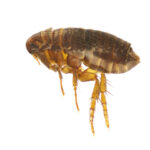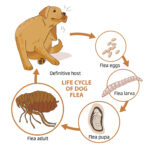
Need Help? Call Us On 0161 776 9832 For Expert Pest Control Advice On How To Identify Pest Infestations And Help Solve Your Pest Problem.
Youngs Pest Control Flea Treatment In Middleton
At Youngs Pest Control, we understand the difficulty of dealing with flea infestations. That's why we're here to help. We offer personalized pest control solutions for homes and businesses in the area. Our experienced technicians are committed to using safe and effective methods to eliminate fleas. We are a part of the National Pest Technician Association (NPTA) and have been in the industry for over 15 years, so all our work is of the highest standard.
offer personalized pest control solutions for homes and businesses in the area. Our experienced technicians are committed to using safe and effective methods to eliminate fleas. We are a part of the National Pest Technician Association (NPTA) and have been in the industry for over 15 years, so all our work is of the highest standard.
We at Youngs Pest Control are a local family-run business that strives to keep properties free of fleas for you and your family. Our technicians are experts in the field, so if fleas have taken over, don't hesitate to give us a call.
Some of the services we offer include :
- Flea eradication
- Inspections
- Treatments
- Follow up services
- Prevention Tips
At Youngs Pest Control, our team of skilled pest control experts has witnessed the harm these small pests can cause in homes and commercial properties. This is why we provide efficient and dependable flea treatment services in Middleton that aim to rapidly and effectively remove fleas. When it comes to flea control, it's important to act fast. Fleas are notorious for their ability to spread quickly, jumping from one host to another and laying eggs all around your home or workplace. Even if you only notice a few fleas, the problem can escalate rapidly if left untreated. Fortunately, we have the expertise and equipment needed to tackle even the most severe flea infestations. So whether you need help getting rid of fleas in your home or business premises, we're here to help you achieve a flea-free environment as soon as possible.
What is the process of flea transmission?
Fleas are parasitic insects that can transmit diseases and cause discomfort to humans and animals. The process of flea transmission typically involves the following steps:
- Infestation: Fleas usually infest animals such as dogs, cats, rodents, or wildlife. They can also infest human habitats, especially areas where pets reside.
- Feeding: Fleas require blood to survive and reproduce. When a flea finds a suitable host, it pierces the skin with its mouthparts and feeds on the host's blood. Flea saliva contains anticoagulants and other substances that prevent blood clotting and facilitate feeding.
- Reproduction: After feeding, female fleas lay eggs on the host or in the environment. A single female flea can lay hundreds of eggs during her lifetime. The eggs are small and white and usually fall off the host onto bedding, carpets, or other areas frequented by the host.
- Larval stage: The eggs hatch into larvae within a few days. Flea larvae are worm-like, legless, and blind. They feed on organic matter, such as flea faeces and other debris found in the environment. The larvae go through several moulting stages as they grow.
- Pupation: When the larvae have matured, they spin cocoons and enter the pupal stage. The pupa is a protective structure made of silk and environmental debris. Fleas in the pupal stage are resistant to many environmental conditions.
- Emergence: Fleas can remain in the pupal stage for weeks to months, depending on environmental conditions. They can sense the presence of a potential host, such as warmth, carbon dioxide, or vibrations, and emerge from the cocoon when they detect suitable conditions.
- Host infestation: Once they emerge, the adult fleas actively seek out a host for feeding. They jump onto passing animals or humans using their powerful hind legs. Fleas can jump relatively long distances compared to their small size.
- Feeding and reproduction cycle: Once on the host, fleas begin feeding on blood. Female fleas need a blood meal to produce eggs. After feeding, they mate with male fleas on the host. The cycle then repeats as the female flea lays eggs, eventually falling off and contaminating the environment, leading to a new generation of fleas.
It's important to note that fleas can transmit diseases during feeding. The bubonic plague is the most well-known disease transmitted by fleas, although this is rare in modern times. Besides transmitting diseases such as typhus and tapeworms, fleas can also carry other diseases. Our team in Middleton are trained to tackle any flea infestation so that you have your peace restored once again.
What precautions should I take before initiating treatment?

By taking these necessary steps in preparation for our flea control treatments, we can provide maximum effectiveness in removing any existing flea problems within your home.
What steps should be followed post-treatment?
Now that the pest professionals have eliminated those pesky fleas from your home, it's time to sit back and enjoy a flea-free environment. However, there are a few things you need to keep in mind after the eradication process has been completed. Here are some important steps to take:
- Vacuuming: After the pest control experts leave, wait two weeks to vacuum your entire home thoroughly, paying special attention to areas where pets spend most of their time. This will help eliminate any dead fleas or eggs that might still be lingering around.
- Washing: It is also essential to wash all bedding, towels and any other fabric your pet may have come into contact with during its flea infestation.
- Follow-up treatment: Sometimes, a follow-up treatment may be necessary if the flea infestation is severe.
Remember that even after successful treatment by our flea exterminator, fleas can return. So watch for early signs such as scratching or bites on yourself or your pets.
Understanding the Consequences of Inadequate Flea Control: The Dangers of DIY Methods.
It's important to be aware of the risks associated with ineffective flea control methods, as DIY attempts can often lead to disastrous outcomes. While many over-the-counter products are available for flea eradication, not all of them are effective. Using the wrong product or applying it incorrectly can result in a wasted effort, allowing fleas to continue infesting your home and biting you and your pets. Moreover, some of these products may contain harmful chemicals that pose a risk to your health or that of your furry friends.
The best way to deal with flea infestations is by seeking professional help from pest control experts like Youngs Pest
